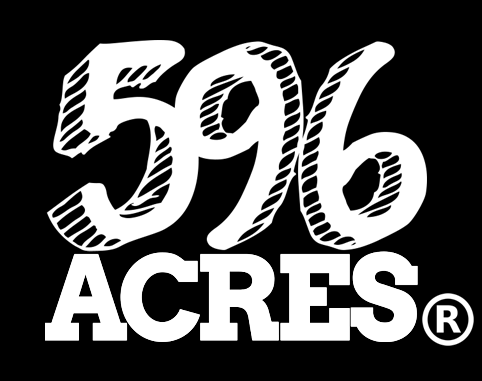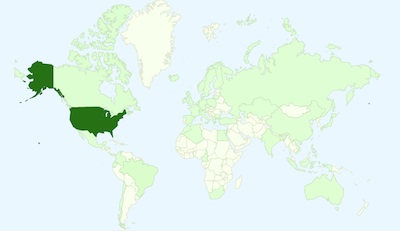We ran some Google analytics and noticed that folks all over the world are checking out our site. The green areas are all places that have virtually checked out the Acres.
This is great news. Maps and signs and green spaces where communities can be together are tactics that work well to build stronger bonds between people everywhere. Below is the story of our friends in Rio de Janeiro, Brasil, building a garden in the face of gentrification and pacification in the favelas of that city.
GREEN MY FAVELA: AN ACT OF DEFIANCE
Lea Rekow, Rio de Janeiro, Brasil
Fear, intimidation, and the ongoing militarization of space are all attempts to contain the favela as a space characterized by forceful occupation. Military police now control Rio de Janeiro’s Rocinha favela, arguably the largest slum in Brazil, having recently displaced the ruling drug faction. However they still present a heavily armed presence through which they assert control. Rocinha’s quarter of a million residents occupy less than a square kilometer of steep land in a dense labyrinth that has no drainage, planned runoff, or sewerage system. There are few green spaces.
Green My Favela is a collaborative food security project situated inside Rocinha. It is born out of intense socio-political, economic, and cultural repression and represents our capabilities to adapt to the most radical of conditions. Within this context, Green My Favela represents the practice of freedom. Through its very existence, it becomes a mediator for the examination of civil society, and an important catalyst for building social networking that is change in itself.
Green My Favela represents a foodscape of inner city poverty, community needs, urban renewal, and ecological restoration. This long-term project is a collaboration between myself, Tio Lino’s Mundo da Arte, Alegria das and Crianças crèche, and is supported by Visom Digital (under the direction of Adriana, my amazing working partner in this endeavor). Our goals are to work with children to produce food to feed children; to cultivate edible green space; to increase food security; and provide a safe space for at-risk children. Our metaproject is to locate, map, and reclaim vacant lots in Rocinha, and to develop them as community food forests. The project is fully maintained by the children of Rocinha, under the supervision of Tio Lino.
Our project began with a conversation between myself and Tio Lino, who grew up in Rocinha, and remembers it as a small rural community. The name Rocinha literally means “little farm”. It developed as a local agricultural center settled by Portuguese, French and Italian farmers who cultivated small plots on the hillside from around 1930. It later became a supply center of vegetables for the city of Rio de Janeiro’s Zona Sul (South Zone) at the end of the 1950s after the second world war as more immigrants moved in from other parts of Brazil, such as Minas Gerais and the Northeast.
Tio was able to gain access to a vacant lot of land that had long been used as a dumping ground by local residents. Years of trash had built up on the site, an area of around 8 meters square. Trash had even been dumped in the water supply, which was now disused, and a potential haven for all kinds of infectious diseases.
In January this year, with the help of 14 Australian volunteers, Tio Lino and the kids from his children’s center, Rocinha Media School, and some local workers, we began transforming the space. We first removed the layers of trash, repurposing some of the materials to use in the garden. There were piles of bricks which we used to help build a series of terraces, steps, pathways, and garden beds, as the land is quite steep. We raked out the remaining trash from the soil, tilled it, sealed the old trash-filled water supply, lay pipes to a clean water supply, and have laid mulch and organic fertilizer as a top layer. We are now relying on the children to plant, cultivate, and maintain the garden on a daily basis.
We are ready to plant the edibles, and are on our biggest mission yet, to find organic seeds and seedlings which are not commercially available for purchase in Brazil. At least we have located an organic farm two hours out of the city with which we have scheduled a visit. We are also waiting for the soil tests to come back to us.
On the advice of 596, we are also beginning to map other vacant lots and are preparing to identify them by branding them with signage. Soaring real estate prices in Rio due to the upcoming 2014 World Cup and 2016 Olympics have now made the city more expensive to live in than New York. With the favela now “pacified” by police, real estate prices have tripled overnight. Our fear is that these vacant lots will be gobbled up by development, so we are strategizing how to secure and conserve them as green spaces.
As we move forward, our overall aim is to see Rocinha socially and environmentally restored through providing Rocinha’s children with creative purpose, real-world education, affection, and motivation to improve their quality of life, oh yeah, and good, healthy food!
Photos of the garden are available at: http://www.flickr.com/photos/greenmyfavela/
and you can watch a video of the first planting here: http://youtu.be/D-bYWKSDmzk








